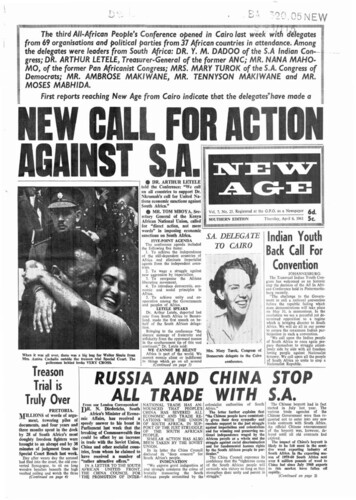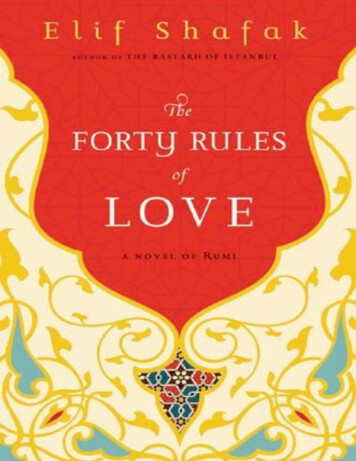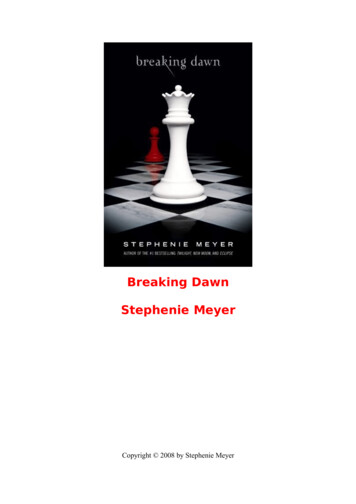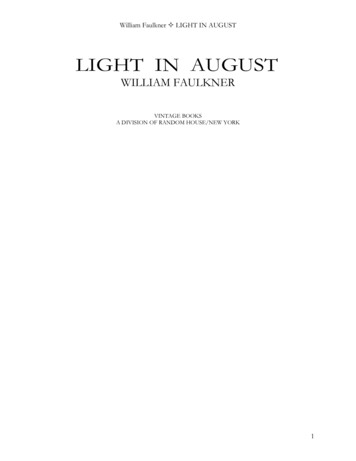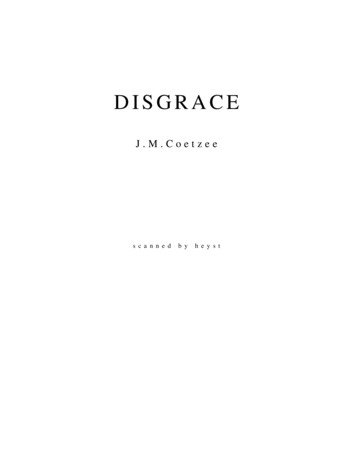
Transcription
DISGRACEJ.M.Coetzees c a n n e db yh e y s t
ONEFOR A MAN of his age, fifty-two, divorced, he has, to his mind, solved the problem of sex rather well.On Thursday afternoons he drives to Green Point. Punctually at two p.m. he presses the buzzer at theentrance to Windsor Mansions, speaks his name, and enters. Waiting for him at the door of No. 113 isSoraya. He goes straight through to the bedroom, which is pleasant-smelling and softly lit, and undresses.Soraya emerges from the bathroom, drops her robe, slides into bed beside him. 'Have you missed me?' sheasks. 'I miss you all the time,' he replies. He strokes her honey-brown body, unmarked by the sun; hestretches her out, kisses her breasts; they make love.Soraya is tall and slim, with long black hair and dark, liquid eyes. Technically he is old enough to be herfather; but then, technically, one can be a father at twelve. He has been on her books for over a year; hefinds her entirely satisfactory. In the desert of the week Thursday has become an oasis of luxe et volupté.In bed Soraya is not effusive. Her temperament is in fact rather quiet, quiet and docile. In her generalopinions she is surprisingly moralistic. She is offended by tourists who bare their breasts ( udders', shecalls them) on public beaches; she thinks vagabonds should be rounded up and put to work sweeping thestreets. How she reconciles her opinions with her line of business he does not ask.Because he takes pleasure in her, because his pleasure is unfailing, an affection has grown up in him forher. To some degree, he believes, this affection is reciprocated. Affection may not be love, but it is at leastits cousin. Given their unpromising beginnings, they have been lucky, the two of them: he to have foundher, she to have found him.His sentiments are, he is aware, complacent, even uxorious. Nevertheless he does not cease to hold tothem.For a ninety-minute session he pays her R400, of which half goes to Discreet Escorts. It seems a pity thatDiscreet Escorts should get so much. But they own No. 113 and other flats in Windsor Mansions; in asense they own Soraya too, this part of her, this function.He has toyed with the idea of asking her to see him in her own time. He would like to spend an eveningwith her, perhaps even a whole night. But not the morning after. He knows too much about himself tosubject her to a morning after, when he will be cold, surly, impatient to be alone.That is his temperament. His temperament is not going to change, he is too old for that. His temperamentis fixed, set. The skull, followed by the temperament: the two hardest parts of the body.Follow your temperament. It is not a philosophy, he would not dignify it with that name. It is a rule, likethe Rule of St Benedict.He is in good health, his mind is clear. By profession he is, or has been, a scholar, and scholarship stillengages, intermittently, the core of him. He lives within his income, within his temperament, within hisemotional means. Is he happy? By most measurements, yes, he believes he is. However, he has notforgotten the last chorus of Oedipus: Call no man happy until he is dead.In the field of sex his temperament, though intense, has never been passionate. Were he to choose a totem,it would be the snake. Intercourse between Soraya and himself must be, he imagines,rather like thecopulation of snakes: lengthy, absorbed, but rather abstract, rather dry, even at its hottest.Is Soraya's totem the snake too? No doubt with other men she becomes another woman: la donna emobile. Yet at the level of temperament her affinity with him can surely not be feigned.Though by occupation she is a loose woman he trusts her, within limits. During their sessions he speaks toher with a certain freedom, even on occasion unburdens himself. She knows the facts of his life. She hasheard the stories of his two marriages, knows about his daughter and his daughter's ups and downs. Sheknows many of his opinions.Of her life outside Windsor Mansions Soraya reveals nothing. Soraya is not her real name, that he is sureof. There are signs she has borne a child, or children. It may be that she is not a professional at all. Shemay work for the agency only one or two afternoons a week, and for the rest live a respectable life in thesuburbs, in Rylands or Athlone. That would be unusual for a Muslim, but all things are possible thesedays.
About his own job he says little, not wanting to bore her. He earns his living at the Cape TechnicalUniversity, formerly Cape Town University College. Once a professor of modern languages, he has been,since Classics and Modern Languages were closed down as part of the great rationalization, adjunctprofessor of communications. Like all rationalized personnel, he is allowed to offer one special-fieldcourse a year, irrespective of enrolment, because that is good for morale. This year he is offering a coursein the Romantic poets. For the rest he teaches Communications 101, Communication Skills', andCommunications 201, 'Advanced Communication Skills'.Although he devotes hours of each day to his new discipline, he finds its first premise, as enunciated in theCommunications 101 handbook, preposterous: 'Human society has created language in order that we maycommunicate our thoughts, feelings and intentions to each other.' His own opinion, which he does not air,is that the origins of speech lie in song, and the origins of song in the need to fill out with sound theoverlarge and rather empty human soul.In the course of a career stretching back a quarter of a century he has published three books, none ofwhich has caused a stir or even a ripple: the first on opera (Boito and the Faust Legend: The Genesis ofMefistofele), the second on vision as eros (The Vision of Richard of St Victor), the third on Wordsworthand history (Wordsworth and the Burden of the Past).In the past few years he has been playing with the idea of a work on Byron. At first he had thought itwould be another book, another critical opus. But all his sallies at writing it have bogged down in tedium.The truth is, he is tired of criticism, tired of prose measured by the yard. What he wants to write is music:Byron in Italy, a meditation on love between the sexes in the form of a chamber opera.Through his mind, while he faces his Communications classes, flit phrases, tunes, fragments of song fromthe unwritten work. He has never been much of a teacher; in this transformed and, to his mind,emasculated institution of learning he is more out of place than ever. But then, so are other of hiscolleagues from the old days, burdened with upbringings inappropriate to the tasks they are set to perform;clerks in a post-religious age.Because he has no respect for the material he teaches, he makes no impression on his students. They lookthrough him when he speaks, forget his name. Their indifference galls him more than he will admit.Nevertheless he fulfils to the letter his obligations toward them, their parents, and the state. Month aftermonth he sets, collects, reads, and annotates their assignments, correcting lapses in punctuation, spellingand usage, interrogating weakarguments, appending to each paper a brief considered critique.He continues to teach because it provides him with a livelihood; also because it teaches him humility,brings it home to him who he is in the world. The irony does not escape him: that the one who comes toteach learns the keenest of lessons, while those who come to learn learn nothing. It is a feature of hisprofession on which he does not remark to Soraya. He doubts there is an irony to match it in hers.In the kitchen of the flat in Green Point there are a kettle, plastic cups, a jar of instant coffee, a bowl withsachets of sugar. The refrigerator holds a supply of bottled water. In the bathroom there is soap and a pileof towels, in the cupboard clean bedlinen. Soraya keeps her makeup in an overnight bag. A place ofassignation, nothing more, functional, clean, well regulated.The first time Soraya received him she wore vermilion lipstick and heavy eyeshadow. Not liking thestickiness of the makeup, he asked her to wipe it off. She obeyed, and has never worn it since. A readylearner, compliant, pliant.He likes giving her presents. At New Year he gave her an enamelled bracelet, at Eid a little malachiteheron that caught his eye in a curio shop. He enjoys her pleasure, which is quite unaffected.It surprises him that ninety minutes a week of a woman's company are enough to make him happy, whoused to think he needed a wife, a home, a marriage. His needs turn out to be quite light, after all, light andfleeting, like those of a butterfly. No emotion, or none but the deepest, the most unguessed-at: a groundbass of contentedness, like the hum of traffic that lulls the city-dweller to sleep, or like the silence of thenight to countryfolk.He thinks of Emma Bovary, coming home sated, glazen-eyed, from an afternoon of reckless fucking. Sothis is bliss!, says Emma, marvelling at herself in the mirror. So this is the bliss the poets speak of! Well, if
poor ghostly Emma were ever to find her way to Cape Town, he would bring her along one Thursdayafternoon to show her what bliss can be: a moderate bliss, a moderated bliss.Then one Saturday morning everything changes. He is in the city on business; he is walking down StGeorge's Street when his eyes fall on a slim figure ahead of him in the crowd. It is Soraya, unmistakably,flanked by two children, two boys. They are carrying parcels; they have been shopping.He hesitates, then follows at a distance. They disappear into Captain Dorego's Fish Inn. The boys haveSoraya's lustrous hair and dark eyes. They can only be her sons.He walks on, turns back, passes Captain Dorego's a second time. The three are seated at a table in thewindow. For an instant, through the glass, Soraya's eyes meet his.He has always been a man of the city, at home amid a flux of bodies where eros stalks and glances flashlike arrows. But this glance between himself and Soraya he regrets at once.At their rendezvous the next Thursday neither mentions the incident. Nonetheless, the memory hangsuneasily over them. He has no wish to upset what must be, for Soraya, a precarious double life. He is allfor double lives, triple lives, lives lived in compartments. Indeed, he feels, if anything, greater tendernessfor her. Your secret is safe with me, he would like to say.But neither he nor she can put aside what has happened. The two little boys become presences betweenthem, playing quiet as shadows in a corner of the room where their mother and the strange man couple. InSoraya's arms he becomes, fleetingly, their father: foster-father, step-father, shadow-father. Leaving herbed afterwards, he feels their eyes flicker over him covertly, curiously.His thoughts turn, despite himself, to the other father, the real one. Does he have any inkling of what hiswife is up to, or has he elected the bliss of ignorance?He himself has no son. His childhood was spent in a family of women. As mother, aunts, sisters fell away,they were replaced in due course by mistresses, wives, a daughter. The company of women made of him alover of women and, to an extent, a womanizer. With his height, his good bones, his olive skin, hisflowing hair, he could always count on a degree of magnetism. If he looked at a woman in a certain way,with a certain intent, she would return his look, he could rely on that. That was how he lived; for years, fordecades, that was the backbone of his life.Then one day it all ended. Without warning his powers fled. Glances that would once have responded tohis slid over, past, through him. Overnight he became a ghost. If he wanted a woman he had to learn topursue her; often, in one way or another, to buy her.He existed in an anxious flurry of promiscuity. He had affairs with the wives of colleagues; he picked uptourists in bars on the waterfront or at the Club Italia; he slept with whores.His introduction to Soraya took place in a dim little sitting-room off the front office of Discreet Escorts,with Venetian blinds over the windows, pot plants in the corners, stale smoke hanging in the air. She wason their books under 'Exotic'. The photograph showed her with a red passion-flower in her hair and thefaintest oflines at the corners of her eyes. The entry said 'Afternoons only'. That was what decided him:the promise of shuttered rooms, cool sheets, stolen hours.From the beginning it was satisfactory, just what he wanted. A bull's eye. In a year he has not needed to goback to the agency.Then the accident in St George's Street, and the strangeness that has followed. Though Soraya still keepsher appointments, he feels a growing coolness as she transforms herself into just another woman and himinto just another client.He has a shrewd idea of how prostitutes speak among themselves about the men who frequent them, theolder men in particular. They tell stories, they laugh, but they shudder too, as one shudders at a cockroachin a washbasin in the middle of the night. Soon, daintily, maliciously, he will be shuddered over. It is afate he cannot escape.On the fourth Thursday after the incident, as he is leaving the apartment, Soraya makes the announcementhe has been steeling himself against. 'My mother is ill. I'm going to take a break to look after her. I won'tbe here next week.' Will I see you the week after?'
I'm not sure. It depends on how she gets on. You had better phone first.' I don't have a number.' Phone the agency. They'll know.'He waits a few days, then telephones the agency. Soraya? Soraya has left us, says the man. No, we cannotput you in touch with her, that would be against house rules. Would you like an introduction to another ofour hostesses? Lots of exotics to choose from -Malaysian, Thai, Chinese, you name it.He spends an evening with another Soraya - Soraya has become, it seems, a popular nom de commerce in a hotel room in Long Street. This one is no more than eighteen, unpractised, to his mind coarse. Sowhat do you do?' she says as she slips off her clothes. 'Export-import,' he says. 'You don't say,' she says.There is a new secretary in his department. He takes her to lunch at a restaurant a discreet distance fromthe campus and listens while, over shrimp salad, she complains about her sons' school. Drug-pedlars hangaround the playing-fields, she says, and the police do nothing. For the past three years she and her husbandhave had their name on a list at the New Zealand consulate, to emigrate. 'You people had it easier. I mean,whatever the rights and wrongs of the situation, at least you knew where you were. You people?' he says.'What people?' I mean your generation. Now people just pick and choose which laws they want to obey. It's anarchy.How can you bring up children when there's anarchy all around?'Her name is Dawn. The second time he takes her out they stop at his house and have sex. It is a failure.Bucking and clawing, she works herself into a froth of excitement that in the end only repels him. Helends her a comb, drives her back to the campus.After that he avoids her, taking care to skirt the office where she works. In return she gives him a hurtlook, then snubs him.He ought to give up, retire from the game. At what age, he wonders, did Origen castrate himself? Not themost graceful of solutions, but then ageing is not a graceful business. A clearing of the decks, at least, sothat one can turn one's mind to the proper business of the old: preparing to die.Might one approach a doctor and ask for it? A simple enough operation, surely: they do it to animals everyday, and animals survive well enough, if one ignores a certain residue of sadness. Severing, tying off: withlocal anaesthetic and a steady hand and a modicum of phlegm one might even do it oneself, out of atextbook. A man on a chair snipping away at himself an ugly sight, but no more ugly, from a certain pointof view, than the same man exercising himself on the body of a woman.There is still Soraya. He ought to close that chapter. Instead, he pays a detective agency to track her down.Within days he has her real name, her address, her telephone number. He telephones at nine in themorning, when the husband and children will be out. Soraya?' he says. 'This is David. How are you?When can I see you again?'A long silence before she speaks. 'I don't know who you are,' she says. 'You are harassing me in my ownhouse. I demand you will never phone me here again, never.'Demand. She means command. Her shrillness surprises him: there has been no intimation of it before. Butthen, what should a predator expect when he intrudes into the vixen's nest, into the home of her cubs?He puts down the telephone. A shadow of envy passes over him for the husband he has never seen.TWOWITHOUT THE Thursday interludes the week is as featureless as a desert. There are days when he doesnot know what to do with himself.He spends more time in the university library, reading all he can find on the wider Byron circle, adding tonotes that already fill two fat files. He enjoys the late-afternoon quiet of the reading room, enjoys the walkhome afterwards: the brisk winter air, the damp, gleaming streets.
He is returning home one Friday evening, taking the long route through the old college gardens, when henotices one of his students on the path ahead of him. Her name is Melanie Isaacs, from his Romanticscourse. Not the best student but not the worst either: clever enough, but unengaged.She is dawdling; he soon catches up with her. 'Hello,' he says.She smiles back, bobbing her head, her smile sly rather than shy. She is small and thin, with close-croppedblack hair, wide, almost Chinese cheekbones, large, dark eyes. Her outfits are always striking. Today shewears a maroon miniskirt with a mustard-coloured sweater and black tights; the gold baubles on her beltmatch the gold balls of her earrings.He is mildly smitten with her. It is no great matter: barely a termpasses when he does not fall for one or other of his charges. Cape Town: a city prodigal of beauty, ofbeauties.Does she know he has an eye on her? Probably. Women are sensitive to it, to the weight of the desiringgaze.It has been raining; from the pathside runnels comes the soft rush of water. My favourite season, my favourite time of day,' he remarks. Do you live around here?' Across the line. I share a flat.' Is Cape Town your home?' No, I grew up in George.' I live just nearby. Can I invite you in for a drink?'A pause, cautious. 'OK. But I have to be back by seven-thirty.'From the gardens they pass into the quiet residential pocket where he has lived for the past twelve years,first with Rosalind, then, after the divorce, alone.He unlocks the security gate, unlocks the door, ushers the girl in. He switches on lights, takes her bag.There are raindrops on her hair. He stares, frankly ravished. She lowers her eyes, offering the sameevasive and perhaps even coquettish little smile as before.In the kitchen he opens a bottle of Meerlust and sets out biscuits and cheese. When he returns she isstanding at the bookshelves, head on one side, reading titles. He puts on music: the Mozart clarinetquintet.Wine, music: a ritual that men and women play out with each other. Nothing wrong with rituals, they wereinvented to ease the awkward passages. But the girl he has brought home is not just thirty years his junior:she is a student, his student, under his tutelage. No matter what passes between them now, they will haveto meet again as teacher and pupil. Is he prepared for that? Are you enjoying the course?' he asks. I liked Blake. I liked the Wonderhorn stuff.'Wunderhorn.''I'm not so crazy about Wordsworth.' You shouldn't be saying that to me. Wordsworth has been one of my masters.'It is true. For as long as he can remember, the harmonies of The Prelude have echoed within him. Maybe by the end of the course I'll appreciate him more. Maybe he'll grow on me.' Maybe. But in my experience poetry speaks to you either at first sight or not at all. A flash of revelationand a flash of response. Like lightning. Like falling in love.'Like falling in love. Do the young still fall in love, or is that mechanism obsolete by now, unnecessary,quaint, like steam locomotion? He is out of touch, out of date. Falling in love could have fallen out offashion and come back again half a dozen times, for all he knows. Do you write poetry yourself?' he asks. I did when I was at school. I wasn't very good. I haven't got the time now.' And passions? Do you have any literary passions?'She frowns at the strange word. 'We did Adrienne Rich and Toni Morrison in my second year. And AliceWalker. I got pretty involved. But I wouldn't call it a passion exactly.'So: not a creature of passion. In the most roundabout of ways, is she warning him off?
I am going to throw together some supper,' he says. Will you join me? It will be very simple.'She looks dubious. Come on!' he says. 'Say yes!' OK. But I have to make a phone call first.'The call takes longer than he expected. From the kitchen he hears murmurings, silences. What are your career plans?' he asks afterwards. Stagecraft and design. I'm doing a diploma in theatre.' And what is your reason for taking a course in Romantic poetry?'She ponders, wrinkling her nose. 'It's mainly for the atmosphere that I chose it,' she says. 'I didn't want totake Shakespeare again. I took Shakespeare last year.'What he throws together for supper is indeed simple: anchovies on tagliatelle with a mushroom sauce. Helets her chop the mushrooms. Otherwise she sits on a stool, watching while he cooks. They eat in thedining-room, opening a second bottle of wine. She eats without inhibition. A healthy appetite, forsomeone so slight. Do you always cook for yourself?' she asks. I live alone. If I don't cook, no one will.' I hate cooking. I guess I should learn.' Why? If you really hate it, marry a man who cooks.'Together they contemplate the picture: the young wife with the daring clothes and gaudy jewellerystriding through the front door, impatiently sniffing the air; the husband, colourless Mr Right, apronned,stirring a pot in the steaming kitchen. Reversals: the stuff of bourgeois comedy. That's all,' he says at the end, when the bowl is empty. 'No dessert, unless you want an apple or someyoghurt. Sorry - I didn't know I would be having a guest.' It was nice,' she says, draining her glass, rising. 'Thanks.' Don't go yet.' He takes her by the hand and leads her to the sofa. 'I have something to show you. Do youlike dance? Not dancing: dance.' He slips a cassette into the video machine. 'It's a film by a man namedNorman McLaren. It's quite old. I found it in the library. See what you think.'Sitting side by side they watch. Two dancers on a bare stage move through their steps. Recorded by astroboscopic camera, their images, ghosts of their movements, fan out behind them like wingbeats. It is afilm he first saw a quarter of a century ago but is still captivated by: the instant of the present and the pastof that instant, evanescent, caught in the same space.He wills the girl to be captivated too. But he senses she is not.When the film is over she gets up and wanders around the room. She raises the lid of the piano, strikesmiddle C. 'Do you play?' she says. A bit.' Classics or jazz?' No jazz, I'm afraid.' Will you play something for me?' Not now. I'm out of practice. Another time, when we know each other better.'She peers into his study. 'Can I look?' she says. Switch on the light.'He puts on more music: Scarlatti sonatas, cat-music. You've got a lot of Byron books,' she says when she comes out. Is he your favourite?' I'm working on Byron. On his time in Italy.' Didn't he die young?' Thirty-six. They all died young. Or dried up. Or went mad and were locked away. But Italy wasn't whereByron died. He died in Greece. He went to Italy to escape a scandal, and settled there. Settled down. Hadthe last big love-affair of his life. Italy was a popular destination for the English in those days. Theybelieved the Italians were still in touch with their natures. Less hemmed in by convention, morepassionate.'
She makes another circuit of the room. 'Is this your wife?' she asks, stopping before the framedphotograph on the coffee-table. My mother. Taken when she was young.' Are you married?' I was. Twice. But now I'm not.' He does not say: Now I make do with what comes my way. He does notsay: Now I make do with whores. Van I offer you a liqueur?'She does not want a liqueur, but does accept a shot of whisky in her coffee. As she sips, he leans over andtouches her cheek. You're very lovely,' he says. 'I'm going to invite you to do something reckless.' Hetouches her again. 'Stay. Spend the night with me.'Across the rim of the cup she regards him steadily. 'Why?' Because you ought to.' Why ought I to?' Why? Because a woman's beauty does not belong to her alone. It is part of the bounty she brings into theworld. She has a duty to share it.'His hand still rests against her cheek. She does not withdraw, but does not yield either. And what if I already share it?' In her voice there is a hint of breathlessness. Exciting, always, to becourted: exciting, pleasurable. Then you should share it more widely.'Smooth words, as old as seduction itself. Yet at this moment he believes in them. She does not ownherself. Beauty does not own itself. From fairest creatures we desire increase,' he says, 'that thereby beauty's rose might never die.'Not a good move. Her smile loses its playful, mobile quality. The pentameter, whose cadence once servedso well to oil the serpent's words, now only estranges. He has become a teacher again, man of the book,guardian of the culture-hoard. She puts down her cup. 'I must leave, I'm expected.'The clouds have cleared, the stars are shining. 'A lovely night,'he says, unlocking the garden gate. She does not look up. 'Shall I walk you home?' No.' Very well. Good night.' He reaches out, enfolds her. For a moment he can feel her little breasts againsthim. Then she slips his embrace and is gone.THREETHAT IS WHERE he ought to end it. But he does not. On Sunday morning he drives to the empty campusand lets himself into the department office. From the filing cabinet he extracts Melanie Isaacs's enrolmentcard and copies down her personal details: home address, Cape Town address, telephone number.He dials the number. A woman's voice answers. Melanie?' I'll call her. Who is speaking?' Tell her, David Lurie.'Melanie - melody: a meretricious rhyme. Not a good name for her. Shift the accent. Meláni: the dark one. Hello?'In the one word he hears all her uncertainty. Too young. She will not know how to deal with him; heought to let her go. But he is in the grip of something. Beauty's rose: the poem drives straight as an arrow.She does not own herself; perhaps he does not own himself either. I thought you might like to go out to lunch,' he says. 'I'll pick you up at, shall we say, twelve.'There is still time for her to tell a lie, wriggle out. But she is too confused, and the moment passes.When he arrives, she is waiting on the sidewalk outside her apartment block. She is wearing black tightsand a black sweater. Her hips are as slim as a twelve-year-old's.
He takes her to Hout Bay, to the harbourside. During the drive he tries to put her at ease. He asks abouther other courses. She is acting in a play, she says. It is one of her diploma requirements. Rehearsals aretaking up a lot of her time.At the restaurant she has no appetite, stares out glumly over the sea. Is something the matter? Do you want to tell me?'She shakes her head. Are you worried about the two of us?' Maybe,' she says. No need. I'll take care. I won't let it go too far.'Too far. What is far, what is too far, in a matter like this? Is her too far the same as his too far?It has begun to rain: sheets of water waver across the empty bay. Shall we leave?' he says.He takes her back to his house. On the living-room floor, to the sound of rain pattering against thewindows, he makes love to her. Her body is clear, simple, in its way perfect; though she is passivethroughout, he finds the act pleasurable, so pleasurable that from its climax he tumbles into blankoblivion.When he comes back the rain has stopped. The girl is lying beneath him, her eyes closed, her hands slackabove her head, a slight frown on her face. His own hands are under her coarse-knit sweater, on herbreasts. Her tights and panties lie in a tangle on the floor; his trousers are around his ankles. After thestorm, he thinks: straight out of George Grosz.Averting her face, she frees herself, gathers her things, leaves the room. In a few minutes she is back,dressed. 'I must go,' she whispers. He makes no effort to detain her.He wakes the next morning in a state of profound wellbeing, which does not go away. Melanie is not inclass. From his office he telephones a florist. Roses? Perhaps not roses. He orders carnations. 'Red orwhite?' asks the woman. Red? White? 'Send twelve pink,' he says. 'I haven't got twelve pink. Shall I send amix?' Send a mix,' he says.Rain falls all of Tuesday, from heavy clouds blown in over the city from the west. Crossing the lobby ofthe Communications Building at the end of the day, he spies her at the doorway amid a knot of studentswaiting for a break in the downpour. He comes up behind her, puts a hand on her shoulder. 'Wait for mehere,' he says. 'I'll give you a ride home.'He returns with an umbrella. Crossing the square to the parking lot he draws her closer to shelter her. Asudden gust blows the umbrella inside out; awkwardly they run together to the car.She is wearing a slick yellow raincoat; in the car she lowers the hood. Her face is flushed; he is aware ofthe rise and fall of her chest. She licks away a drop of rain from her upper lip. A child! he thinks: No morethan a child! What am I doing? Yet his heart lurches with desire.They drive through d
bass of contentedness, like the hum of traffic that lulls the city-dweller to sleep, or like the silence of the night to countryfolk. He thinks of Emma Bovary, coming home sated, glazen-eyed, from an afternoon of reckless fucking. So this is bliss!, says Emma, marvelling at herself in the

